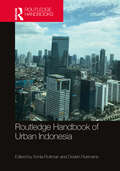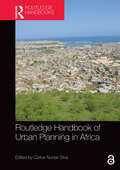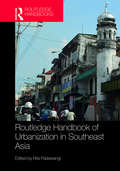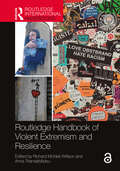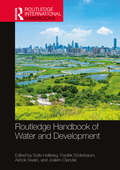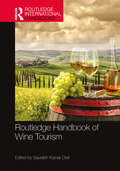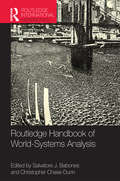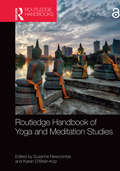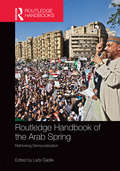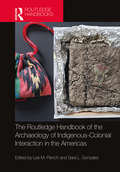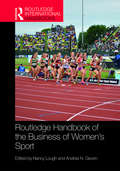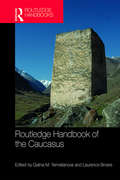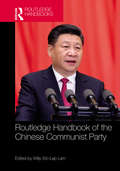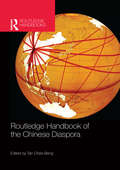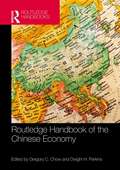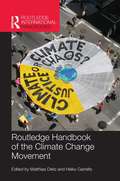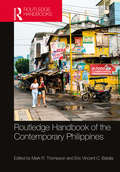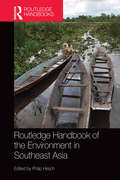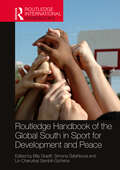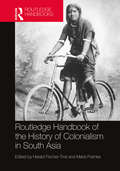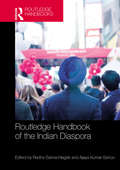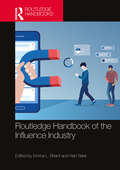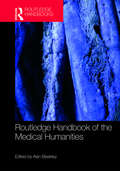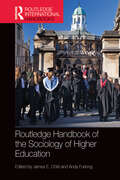- Table View
- List View
Routledge Handbook of Urban Indonesia
by Deden Rukmana Sonia RoitmanThis handbook focuses on the practices, initiatives, and innovations of urban planning in response to the rapid urbanisation in Indonesian cities. The book provides rigorous evidence of planning Indonesian cities of different sizes. Indonesia, the world’s fourth most populous country, is increasingly urbanising. Through the lens of the Sustainable Development Goals, chapters examine specific policies and projects and analyse 19 cities, ranging from a megacity of over ten million residents to metropolitan cities, large cities, medium cities, and small cities in Indonesia. The handbook provides a diverse view of urban conditions in the country. Discussing current trends and challenges in urban planning and development in Indonesia, it covers a wide range of topics organised into five main themes: Indonesian planning context; informality, insurgency, and social inclusion; design, spatial, and economic practices; creative and innovative practices; and urban sustainability and resilience. Written by 64 established and emerging scholars from Indonesia and overseas, this handbook is an invaluable resource to academics working on Urban Studies, Development Studies, Asian and Southeast Studies as well as to policy-makers in Indonesia and in other cities of the Global South.
Routledge Handbook of Urban Planning in Africa
by Carlos Nunes SilvaThis handbook contributes with new evidence and new insights to the on-going debate on the de-colonization of knowledge on urban planning in Africa. African cities grew rapidly since the mid-20th century, in part due to rising rural migration and rapid internal demographic growth that followed the independence in most African countries. This rapid urbanization is commonly seen as a primary cause of the current urban management challenges with which African cities are confronted. This importance given to rapid urbanization prevented the due consideration of other dimensions of the current urban problems, challenges and changes in African cities. The contributions to this handbook explore these other dimensions, looking in particular to the nature and capacity of local self-government and to the role of urban governance and urban planning in the poor urban conditions found in most African cities. It deals with current and contemporary urban challenges and urban policy responses, but also offers an historical overview of local governance and urban policies during the colonial period in the late 19th and 20th centuries, offering ample evidence of common features, and divergent features as well, on a number of facets, from intra-urban racial segregation solutions to the relationships between the colonial power and the natives, to the assimilation policy, as practiced by the French and Portuguese and the Indirect Rule put in place by Britain in some or in part of its colonies. Using innovative approaches to the challenges confronting the governance of African cities, this handbook is an essential read for students and scholars of Urban Africa, urban planning in Africa and African Development.
Routledge Handbook of Urban Planning in Africa
by Carlos Nunes SilvaThis handbook contributes with new evidence and new insights to the on-going debate on the de-colonization of knowledge on urban planning in Africa.African cities grew rapidly since the mid-20th century, in part due to rising rural migration and rapid internal demographic growth that followed the independence in most African countries. This rapid urbanization is commonly seen as a primary cause of the current urban management challenges with which African cities are confronted. This importance given to rapid urbanization prevented the due consideration of other dimensions of the current urban problems, challenges and changes in African cities. The contributions to this handbook explore these other dimensions, looking in particular to the nature and capacity of local self-government and to the role of urban governance and urban planning in the poor urban conditions found in most African cities. It deals with current and contemporary urban challenges and urban policy responses, but also offers an historical overview of local governance and urban policies during the colonial period in the late 19th and 20th centuries, offering ample evidence of common features, and divergent features as well, on a number of facets, from intra-urban racial segregation solutions to the relationships between the colonial power and the natives, to the assimilation policy, as practiced by the French and Portuguese and the Indirect Rule put in place by Britain in some or in part of its colonies.Using innovative approaches to the challenges confronting the governance of African cities, this handbook is an essential read for students and scholars of Urban Africa, urban planning in Africa and African Development.
Routledge Handbook of Urbanization in Southeast Asia
by Rita PadawangiThe study of urbanization in Southeast Asia has been a growing field of research over the past decades. The Routledge Handbook of Urbanization in Southeast Asia offers a collection of the major streams and themes in the studies of the cities in the region. A focus on the urbanization process rather than the city as an object opens the topic more broadly to bring together different perspectives. This timely handbook presents these diverse views to build a clearer understanding of theoretical contributions of urban studies in Southeast Asia and to provide a complete collection of scholarly works that are thematically structured and a useful tool for teaching urbanization in Southeast Asia. Following the introduction by the editor, the handbook is structured along central, emerging themes. It contains six parts, which are each introduced by the editor: Theorizing Urbanization in Southeast Asia Migration, Networks and Identities Development and Discontents Environmental Governance The Social Production of the Urban Fabric Social Change and Alternative Development This handbook will be an essential reference work for scholars interested in Urban Studies, cities and urbanization in Asia, and Southeast Asian Studies.
Routledge Handbook of Violent Extremism and Resilience (Routledge International Handbooks)
by Anna Triandafyllidou Richard McNeil-WillsonAt a time of great global uncertainty and instability, communities face fracturing from the increasing influence of extremist movements hostile to democratic and multicultural norms. Europe and the West have grown increasingly polarised in recent years, beset with financial crises, political instability, the rise of malicious actors and irregular violence, and new forms of media and social media. These factors have enabled the spread of new forms of extremism and suggest a growing need for a response sensitive to inequalities and divisions in wider society – a task made even more urgent by the COVID- 19 pandemic. The Routledge Handbook of Violent Extremism and Resilience brings together research conducted throughout Europe and the world, to analyse various articulations of violent extremism and consider the impact that such groups and networks have had on the wellbeing of communities and societies. It examines different theories, factors, and national case studies of extremism, polarisation, and societal fragmentation, drilling deep into national examples to map trends across Europe, North America, and Australasia, to provide regional and state-level comparative analysis. It also offers a thorough exploration of resilience – a recent addition to counterextremism policy and practice – to consider how it has come to play this increasingly central role in Preventing and Countering Violent Extremism (P/ CVE), the limitations and opportunities of such approaches, and how it could be shared, developed, problematised, and deployed in response to violence and polarisation. The Handbook details new trends in both violent extremism and counter-extremism response, within this increasingly fractured global context. It critically explores the latest theories of community violence, extremism, polarisation, and resilience, mapping them across case study countries. In doing so, it presents new findings for students, researchers, practitioners, and policymakers seeking to understand these new patterns of polarisation and extremism and develop community-driven responses.
Routledge Handbook of Water and Development (Routledge International Handbooks)
by Fredrik Söderbaum Joakim Öjendal Sofie Hellberg Ashok SwainWater is essential for human life and at the centre of political, economic, and socio-cultural development. This Routledge Handbook of Water and Development offers a systematic, wide-ranging, and state-of-the-art guide to the diverse links between water and development across the globe. It is organized into four parts: Part I explores the most significant theories and approaches to the relationship between water and development. Part II consists of carefully selected in-depth case studies, revealing how water utilization and management are deeply intertwined with historical development paths and economic and socio-cultural structures. Part III analyses the role of governance in the management of water and development. Part IV covers the most urgent themes and issues pertaining to water and development in the contemporary world, ranging from climate change and water stress to agriculture and migration. The 32 chapters by leading experts are meant to stimulate researchers and students in a wide range of disciplines in the social and natural sciences, including Geography, Environmental Studies, Development Studies, and Political Science. The Handbook will also be of great value to policymakers and practitioners.
Routledge Handbook of Wine Tourism
by Saurabh Kumar DixitWine tourism or enotourism or oenotourism or winery tourism or vinitourism is a special interest tourism that empowers local culture and spawns business opportunities for the local community. The comprehensive Routledge Handbook of Wine Tourism offers a thorough inquiry into both regular and emerging issues of wine tourism. Modern wine tourism extends beyond the mere cultivation of grapes and the production and selling of wine. The Routledge Handbook of Wine Tourism examines the complex interplay of market profiling, sustainable regional development, and innovative experiential marketing constructs which, when successful, contribute to the growth and sustainable evolution of global wine tourism. This handbook examines how the success of various enotourism events such as vineyard visits, winery tours, wine festivals and wine trails can stimulate the development of wine-producing regions and territories. Incorporating the latest philosophies and research themes, this handbook will be an essential reference for students, researchers, academics and industry practitioners of hospitality and tourism, gastronomy, management, marketing, cultural studies, development studies, international business and for encouraging dialogue across disciplinary boundaries.
Routledge Handbook of World-Systems Analysis (Routledge International Handbooks)
by Christopher Chase-Dunn Salvatore J. BabonesWorld-systems analysis has developed rapidly over the past thirty years. Today's students and junior scholars come to world-systems analysis as a well-established approach spanning all of the social sciences. The best world-systems scholarship, however, is spread across multiple methodologies and more than half a dozen academic disciplines. Aiming to crystallize forty years of progress and lay the groundwork for the continued development of the field, the Handbook of World-Systems Analysis is a comprehensive review of the state of the field of world-systems analysis since its origins almost forty years ago. The Handbook includes contributions from a global, interdisciplinary group of more than eighty world-systems scholars. The authors include founders of the field, mid-career scholars, and newly emerging voices. Each one presents a snapshot of an area of world-systems analysis as it exists today and presents a vision for the future. The clear style and broad scope of the Handbook will make it essential reading for students and scholars of anthropology, archaeology, geography, political science, history, sociology, and development economics.
Routledge Handbook of Yoga and Meditation Studies
by Suzanne NewcombeThe Routledge Handbook of Yoga and Meditation Studies is a comprehensive and interdisciplinary resource, which frames and contextualises the rapidly expanding fields that explore yoga and meditative techniques. The book analyses yoga and meditation studies in a variety of religious, historical and geographical settings. The chapters, authored by an international set of experts, are laid out across five sections: Introduction to yoga and meditation studies History of yoga and meditation in South Asia Doctrinal perspectives: technique and praxis Global and regional transmissions Disciplinary framings In addition to up-to-date explorations of the history of yoga and meditation in the Indian subcontinent, new contexts include a case study of yoga and meditation in the contemporary Tibetan diaspora, and unique summaries of historical developments in Japan and Latin America as well as an introduction to the growing academic study of yoga in Korea. Underpinned by critical and theoretical engagement, the volume provides an in-depth guide to the history of yoga and meditation studies and combines the best of established research with attention to emerging directions for future investigation. This handbook will be of interest to multidisciplinary academic audiences from across the humanities, social sciences and sciences.
Routledge Handbook of the Arab Spring: Rethinking Democratization
by Larbi SadikiThe self-immolation of Mohammed Bouazizi in Tunisia in December 2010 heralded the arrival of the ‘Arab Spring,’ a startling, yet not unprecedented, era of profound social and political upheaval. The meme of the Arab Spring is characterised by bottom-up change, or the lack thereof, and its effects are still unfurling today. The Routledge Handbook of the Arab Spring seeks to provide a departure point for ongoing discussion of a fluid phenomenon on a plethora of topics, including: Contexts and contests of democratisation The sweep of the Arab Spring Egypt Women and the Arab Spring Agents of change and the technology of protest Impact of the Arab Spring in the wider Middle East and further afield Collating a wide array of viewpoints, specialisms, biases, and degrees of proximity and distance from events that shook the Arab world to its core, the Handbook is written with the reader in mind, to provide students, practitioners, diplomats, policy-makers and lay readers with contextualization and knowledge, and to set the stage for further discussion of the Arab Spring.
Routledge Handbook of the Archaeology of Indigenous-Colonial Interaction in the Americas
by Lee M. Panich; Sara L. GonzalezThe Routledge Handbook of the Archaeology of Indigenous-Colonial Interaction in the Americas brings together scholars from across the hemisphere to examine how archaeology can highlight the myriad ways that Indigenous people have negotiated colonial systems from the fifteenth century through to today. The contributions offer a comprehensive look at where the archaeology of colonialism has been and where it is heading. Geographically diverse case studies highlight longstanding theoretical and methodological issues as well as emerging topics in the field. The organization of chapters by key issues and topics, rather than by geography, fosters exploration of the commonalities and contrasts between historical contingencies and scholarly interpretations. Throughout the volume, Indigenous and non-Indigenous contributors grapple with the continued colonial nature of archaeology and highlight Native perspectives on the potential of using archaeology to remember and tell colonial histories. This volume is the ideal starting point for students interested in how archaeology can illuminate Indigenous agency in colonial settings. Professionals, including academic and cultural resource management archaeologists, will find it a convenient reference for a range of topics related to the archaeology of colonialism in the Americas.
Routledge Handbook of the Business of Women's Sport (Routledge International Handbooks)
by Nancy Lough Andrea N. GeurinCombining knowledge from sport management, marketing, media, leadership, governance, and consumer behavior in innovative ways, this book goes further than any other in surveying current theory and research on the business of women’s sport around the world, making it an unparalleled resource for all those who aspire to work in, or understand, women’s sport. Featuring international perspectives, with authors from North America, South America, Europe, Asia, and Oceania, and insightful, in-depth profiles of real leaders within different sectors of women's sport in the global sport industry, the Routledge Handbook of the Business of Women's Sport offers an integrated understanding of the ways traditional media and social media impact both the understanding and advancement of women’s sport properties, businesses, teams, and athletes. Innovative case studies show how societal issues such as gender, power, and framing impact the business of women’s sports and those who work in women’s sport. An essential reference for any researcher or advanced student with an interest in women’s sport or women in business, and useful supplementary reading for researchers and advanced students working in sport business, sport management, mainstream business and management, or women’s studies.
Routledge Handbook of the Caucasus
by Galina M. Yemelianova Laurence BroersThe Routledge Handbook of the Caucasus offers an integrated, multidisciplinary overview of the historical, ethno-linguistic, cultural, socio-economic and political complexities of the Caucasus. Covering both the North and South Caucasus, the book gathers together leading Western, Caucasian and Russian scholars of the region from different disciplines in the humanities and social sciences. Following a thorough introduction by the editors, the handbook is divided into six parts which combine thematic and chronological principles: Place, peoples and culture Political history The contemporary Caucasus: politics, economics and societies Conflict and political violence The Caucasus in the wider world Societal and cultural dynamics. This handbook will be an essential reference work for scholars interested in Russian and Eastern-European studies, Eurasian history and politics, and religious and Islamic studies.
Routledge Handbook of the Chinese Communist Party
by Willy Wo-Lap LamWhilst the Chinese Communist Party is one of the most powerful political institutions in the world, it is also one of the least understood, due to the party’s secrecy and tight control over the archives, the press and the Internet. Having governed the People’s Republic of China for nearly 70 years though, much interest remains into how this quintessentially Leninist party governs one-fifth of the world and runs the world’s second-largest economy. The Routledge Handbook of the Chinese Communist Party gives a comprehensive and multi-faceted picture of the party’s traditions and values – as well as its efforts to stay relevant in the twenty-first century. It uses a wealth of contemporary data and qualitative analysis to explore the intriguing relationship between the party on the one hand, and the government, the legal and judicial establishment and the armed forces, on the other. Tracing the influence of Marx, Engels, Lenin and Stalin, as well as Mao Zedong, on contemporary leaders ranging from Deng Xiaoping and Jiang Zemin to Hu Jintao and Xi Jinping, the sections cover: the party’s history and traditions; how the party works and seeks to remain relevant; major policy arenas; the CCP in the twenty-first century. The Routledge Handbook of the Chinese Communist Party will be of interest to students and scholars of Chinese Politics, Asian Politics, Political Parties and International Relations. Go to https://www.bookshop4u.com/lw1 to see Willy Lam introduce the book.
Routledge Handbook of the Chinese Diaspora
by Tan Chee-BengWith around 40 million people worldwide, the ethnic Chinese and the Chinese in diaspora form the largest diaspora in the world. The economic reform of China which began in the late 1970s marked a huge phase of migration from China, and the new migrants, many of whom were well educated, have had a major impact on the local societies and on China. This is the first interdisciplinary Handbook to examine the Chinese diaspora, and provides a comprehensive analysis of the processes and effects of Chinese migration under the headings of: Population and distribution Mainland China and Taiwan’s policies on the Chinese overseas Migration: past and present Economic and political involvement Localization, transnational networks and identity Education, literature and media The Routledge Handbook of the Chinese Diaspora brings together a significant number of specialists from a number of diverse disciplines and covers the major areas of the study of Chinese overseas. This Handbook is therefore an important and valuable reference work for students, scholars and policy makers worldwide who wish to understand the global phenomena of Chinese migration, transnational connections and their cultural and identity transformation.
Routledge Handbook of the Chinese Economy
by Dwight H. Perkins Gregory C. ChowChina's rapid rise to become the world's second largest economy has resulted in an unprecedented impact on the global system and an urgent need to understand the more about the newest economic superpower. The Routledge Handbook of the Chinese Economy is an advanced-level reference guide which surveys the current economic situation in China and its integration into the global economy. An internationally renowned line-up of scholars contribute chapters on the key components of the contemporary economy and their historical foundations. Topics covered include: the history of the Chinese economy from ancient times onwards; economic growth and development; population, the labor market, income distribution, and poverty; legal, political, and financial institutions; and foreign trade and investments. Offering a cutting-edge overview of the Chinese economy, the Handbook is an invaluable resource for academics, researchers, economists, graduate, and undergraduate students studying this ever-evolving field.
Routledge Handbook of the Climate Change Movement (Routledge Environment and Sustainability Handbooks)
by Matthias Dietz Heiko GarreltsThis handbook provides a comprehensive overview of the growing transnational climate movement. A dual focus on climate politics and civil society provides a hitherto unavailable broad and systematic analysis of the current global movement, highlighting how its dynamic and diverse character can play an important role in environmental politics and climate protection. The range of contributors, from well-known academics to activist-scholars, look at climate movements in the developed and developing world, north and south, small and large, central and marginal. The movement is examined as a whole and as single actors, thereby capturing its scope, structure, development, activities and influence. The book thoroughly addresses theoretical approaches, from classic social movement theory to the influence of environmental justice frames, and follows this with a systematic focus on regions, specific NGOs and activists, cases and strategies, as well as relations with peripheral groups. In its breadth, balance and depth, this accessible volume offers a fresh and important take on the question of social mobilization around climate change, making it an essential text for advanced undergraduates, postgraduate students and researchers in the social sciences.
Routledge Handbook of the Contemporary Philippines
by Mark R. Thompson Eric Vincent BatallaThe Philippines is a fascinating example of a "poor country democracy" where issues of economic development and poverty, political participation and stability, as well as ethnicity and migration are crucial. The Routledge Handbook of the Contemporary Philippines provides a comprehensive overview of the current political, economic, social, and cultural issues of the country. The Handbook is divided into the following four sections concentrating on a different aspect of the Philippines: domestic politics; foreign relations; economics and social policy; cultures and movements. In terms of domestic politics, chapters discuss clientelism, bossism, dynasties, pork barrel and corruption as well as institutions - the presidency, congress, the judiciary, the civil service, political parties, and civilian-military relations. The Philippines is confronted with many overseas challenges, with the foreign relations section focused on the country’s relationship with China, Japan, and the USA as well as assessing the impact of the Filipino diaspora community around the world. Regarding economics and social policy, authors examine industrial policy, capital flight, microfinance, technocracy, economic nationalism, poverty, social welfare programs, and livelihoods. The final section on Philippine cultures and movements highlights issues of customs, gender, religion, and nationalism while also examining various social and political forces - the peasantry, the middle class, indigenous peoples, NGOs, the left, trade unionism, the women’s movement, and major insurgencies. Written by leading experts in the field, the Handbook provides students, scholars, and policymakers of Southeast Asia with an interdisciplinary resource on the evolving politics, society, and economics of the Philippines.
Routledge Handbook of the Environment in Southeast Asia
by Philip HirschThe environment is one of the defining issues of our times, and it is closely linked to questions and dilemmas surrounding economic development. Southeast Asia is one of the world’s most economically and demographically dynamic regions, and it is also one in which a host of environmental issues raise themselves. The Routledge Handbook of the Environment in Southeast Asia is a collection of 30 chapters dealing with the most significant scholarly debates in this rapidly growing field of study. Structured in four main parts, it gives a comprehensive regional overview of, and insight into, the environment in Southeast Asia. Wide-ranging and balanced, this handbook promotes scholarly understanding of how environmental issues are dealt with from diverse theoretical perspectives. It offers a detailed empirical understanding of the myriad environmental problems and challenges faced in Southeast Asia. This is the first publication of its kind in this field; a helpful companion for a global audience and for scholars of Southeast Asian studies from a variety of disciplines.
Routledge Handbook of the Global South in Sport for Development and Peace (Routledge International Handbooks)
by Billy Graeff Simona Šafaříková Sambili-Gicheha, Lin CherurbaiThis book explores the field of Sport for Development and Peace (SDP), putting Global South voices and perspectives at the centre of the analysis.Covering a wide range of thematic and methodological areas that inform existing and emerging discourses in SDP, it represents an unparalleled resource for researchers and practitioners working in this area. Arranged into geographical sections covering Africa, Asia, South America, North America and Oceania, the book presents original research in Global South countries or by Global South researchers and practitioners, sometimes in collaboration with colleagues from the Global North. It highlights practices and theories created, developed, interpreted and reinterpreted by people who belong to the communities where these sporting experiences have been taking place, and whose critical reflections and experiences have yet to gain attention in international academic and practitioner communities in the English language. The book presents the views of diverse stakeholders, programme participants, promoters, coaching staff, volunteers, researchers, teachers, lecturers and other actors that have been difficult to access for researchers who do not usually speak languages other than English.A landmark publication in the field of SDP, this book is essential reading for any advanced student, research, practitioner or policy-maker with an interest in the value of sport in international development.
Routledge Handbook of the History of Colonialism in South Asia
by Harald Fischer-TinéThe Routledge Handbook of the History of Colonialism in South Asia provides a comprehensive overview of the historiographical specialisation and sophistication of the history of colonialism in South Asia. It explores the classic works of earlier generations of historians and offers an introduction to the rapid and multifaceted development of historical research on colonial South Asia since the 1990s. Covering economic history, political history, and social history and offering insights from other disciplines and ‘turns’ within the mainstream of history, the handbook is structured in six parts: Overarching Themes and Debates The World of Economy and Labour Creating and Keeping Order: Science, Race, Religion, Law, and Education Environment and Space Culture, Media, and the Everyday Colonial South Asia in the World The editors have assembled a group of leading international scholars of South Asian history and related disciplines to introduce a broad readership into the respective subfields and research topics. Designed to serve as a comprehensive and nuanced yet readable introduction to the vast field of the history of colonialism in the Indian subcontinent, the handbook will be of interest to researchers and students in the fields of South Asian history, imperial and colonial history, and global and world history.
Routledge Handbook of the Indian Diaspora
by Radha Sarma Hegde Ajaya Kumar SahooThe geographical diversity of the Indian diaspora has been shaped against the backdrop of the historical forces of colonialism, nationalism and neoliberal globalization. In each of these global moments, the demand for Indian workers has created the multiple global pathways of the Indian diasporas. The Routledge Handbook of the Indian Diaspora introduces readers to the contexts and histories that constitute the Indian diaspora. It brings together scholars from different parts of the globe, representing various disciplines, and covers extensive spatial and temporal terrain. Contributors draw from a variety of archives and intellectual perspectives in order to map the narratives of the Indian diaspora. The topics covered range from the history of diasporic communities, activism, identity, gender, politics, labour, policy, violence, performance, literature and branding. The handbook analyses a wide array of issues and debates and is organised in six parts: • Histories and trajectories • Diaspora and infrastructures • Cultural dynamics • Representation and identity • Politics of belonging • Networked subjectivities and transnationalism. Providing a comprehensive analysis of the diverse social, cultural and economic contexts that frame diasporic practices, this key reference work will reinvigorate discussions about the Indian diaspora, its global presence and trajectories. It will be an invaluable resource for academics, researchers and students interested in studying South Asia in general and the Indian diaspora in particular.
Routledge Handbook of the Influence Industry
by Vian Bakir Emma L. BriantThis Handbook provides the first comprehensive examination of the influence industry and how it operates worldwide across different domains.The rapid evolution of emerging technologies and data-driven persuasive practices has been linked to the spread of misleading content in domestic and foreign influence campaigns. This has prompted worldwide public and policy discussions about disinformation and how to curb its spread. However, less attention has been paid to the increasingly data-driven commercial industry taking advantage of the opportunities these new technologies afford. The handbook uses the term ‘influence’ here to include not only messaging and public relations (PR), which fell within the traditional focus of propaganda studies, but to consider the infrastructure and actors behind an advanced array of capabilities that can be used in a coordinated way to affect an audience’s emotions, ideas and behaviors in order to advance a state or non-state actor’s objectives – increasingly based on data-driven profiling. The volume fills a gap in scholarship exploring the recent technical, political and economic development of this industry, surveying the extent of different technologies and services offered to clients worldwide across multiple domains (commercial, political, national security and government). The chapters are divided into three thematic sections and evaluate Influence Industry practices, aims and effectiveness across audiences; business practices and economics; and democratic structures and human rights. They also offer advice for researchers and consider key ethical issues and new regulatory approaches.This volume will be of much interest to students of political science, propaganda studies, sociology, communication studies and journalism.
Routledge Handbook of the Medical Humanities
by Bleakley AlanThis authoritative new handbook offers a comprehensive and cutting-edge overview of the state of the medical humanities globally, showing how clinically oriented medical humanities, the critical study of medicine as a global historical and cultural phenomenon, and medicine as a force for cultural change can inform each other. Composed of eight parts, the Routledge Handbook of the Medical Humanities looks at the medical humanities as: a network and system therapeutic provocation forms of resistance a way of reconceptualising the medical curriculum concerned with performance and narrative mediated by artists as diagnosticians of culture through public engagement. This book describes how the medical humanities can be used in and out of clinical settings, acting as a point of resistance, redistributing medicine’s capital amongst its stakeholders, embracing the complexity of medical instances, shaping medical education, promoting interdisciplinary understandings and recognising an identity for the medical humanities as a network effect. This book is an essential read for all students, scholars and practitioners with an interest in the medical humanities.
Routledge Handbook of the Sociology of Higher Education (Routledge International Handbooks)
by Andy Furlong James E. CoteThis is the first handbook to cover the sociological approaches to higher education. It is timely because of global expansions of mass higher educational systems, especially as these systems come under scrutiny by a variety of stakeholders. Questions are being raised about the value of traditional pedagogies along with calls for efficiency, accountability and cost-reduction, but above all job training. Within this neoliberal context, each chapter examines different sociological aspects of, and debates about, educational institutions as status-conferring organizations, with myriad positional characteristics, experiences, and outcomes. Many current debates concern the legitimacy of the statuses conferred, including the continuing debate regarding the role of universities in legitimating social class reproduction as well as more recent concerns about standards in mass systems. This handbook puts these issues and debates in focus in ways that will be of interest to a variety of stakeholders, within academia as well as in policy circles.
